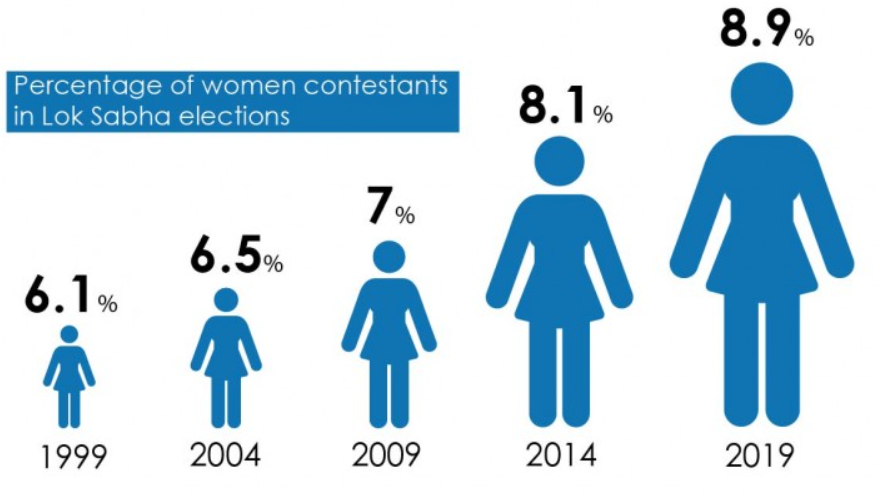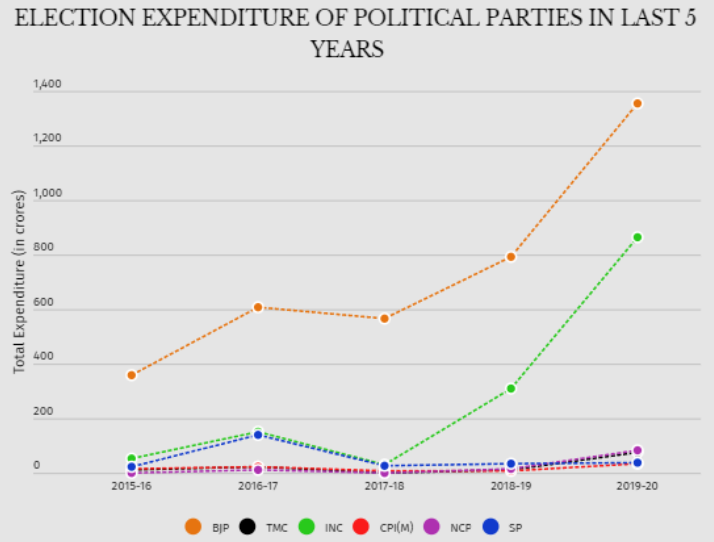Regulating Political Parties
2021 OCT 13
Mains >
Polity > Institutions/Bodies > Political parties
IN NEWS:
- The Election Commission on September 23 notified the updated list of registered political parties that included 2,796 registered unrecognised parties, at a time it has sought the power to deregister inactive parties.
POLITICAL PARTIES:
- A political party is an organised group of citizens who hold common views on governance and act as a political unit that seeks to obtain control of government with a view to further the agenda and policy they profess.
- Based on their ideologies, the spectrum of political parties is as follows:

- There are three kinds of party systems in the world:
- One Party System in which only one ruling party exists and no opposition is permitted. Eg: Former USSR.
- Two-Party System in which two major parties exists. Eg: The Democrats and Republicans in USA.
- Multi-Party System in which there are a number of political parties leading to the formation of coalition governments. Eg: India and France.
- Political parties have extralegal growth in almost every democratic country. The American Constitution does not presume the existence of political parties. In Britain too, political parties are still unknown to the law.
IMPORTANCE OF POLITICAL PARTIES:
- Sustain democracy:
- Political parties are essential institutions of democracy. When citizens join political parties, volunteer their time, donate money and vote for their leaders, they are exercising their basic democratic rights.
- Simplify the democratic process:
- Parties recruit, nominate and support candidates and structure the competition in elections, thereby enabling the functioning of an organized democracy.
- Channel of communication:
- As intermediary institutions, parties link the state and civil society, translating the policy preferences of citizens into political action.
- Accountability mechanism:
- Competitive multi-party system is an extraconstitutional mean of check and balance, as they keep a constant vigil on the ruling government and hold it accountable for any maladministration.
- Generate public awareness:
- Through research, dialogue and deliberations on various matters of general interest, parties help create an informed citizenry.
- Offers diverse choice:
- By professing different ideologies and fielding candidates of varying aptitudes in elections, parties offer citizens a choice in governance.
- Dedicated human resource:
- Political parties create a dedicated cadre of individuals with political ambition are likely to seek out leadership positions within political parties.
POLITICAL PARTIES IN INDIA:
- Political parties in India are extra-constitutional, but they are the breathing air of the political system.
- Section 29A (5) of the Representation of the People Act, 1951 is the only major statutory provision dealing with political parties in India.
- The Election Commission registers political parties for the purpose of elections and grants them recognition as national or state parties on the basis of their poll performance. The other parties are simply declared as registered-unrecognised parties.
- On the latest list of parties are eight national recognised parties — the All-India Trinamool Congress, Bahujan Samaj Party, BJP, CPI, CPI(M), INC, NCP and the National People’s Party and 54 recognised State parties, some of which are recognised in multiple States.
CONCERNS OVER INDIAN POLITICAL PARTIES:
- Absence of internal democracy:
- Political parties in developed nations maintain high levels of internal democracy. However, such a system is nominal in India and leadership in most political parties are highly oligarchic in reality.
- Conduit for corruption & black money:
- Party funds are often from dubious sources. Several parties in India are formed as shell entities solely for the purpose of availing the benefits in taxation and laundering black money.
- Eg: The Election commission has recently raised concern that the Income Tax exemption on donations given to registered parties under Section 13 A of the Income-tax Act could be misused by some.
- Restrain on individual capacities:
- The anti-defection law has given supremacy to the party over the independence of elected representatives. The law has restricted a legislator from voting in line with his conscience, judgement and interests of his electorate which in turn undermines participatory democracy.
- Promotes sectoral politics:
- Several parties in India are openly caste- or religious-based. They are often involved in allegations of hate speeches, promoting enmity and supporting violence between various sections of the society.
- Aversion of youth:
- The recurring cases of corruption, absence of internal democracy, domination of dynasty politics and limited opportunities in elections in parties have alienated the youth from politics.
- Male dominated:
- Although almost all parties have attempted to build women organizations to secure their support and make their organization more broad-based, in practice, they have fielded much less proportion of women candidates in the elections.

- Lack of ideology and values in Politics:
- There has been a very sharp erosion in the ideological orientation of political parties. Party dynamics in India has led to the emergence of valueless politics.
- Eg: The alleged cases of ’horse trading’ witnessed in the recent assembles of Goa, Karnataka and Madhya Pradesh.
- Criminalization:
- The presence of persons with criminal cases has been on the rise in Indian political in parties.
- Eg: According to the Association of Democratic Reforms (ADR), out of the 539 winners analyzed in Lok Sabha 2019, 233 (or 43%) MPs have declared criminal cases against themselves.
- Limited accountability:
- Due to weak intraparty democracy and absence of effective regulation, there parties are rarely held accountable. Also, despite appropriating public funds and working for public welfare, political parties are outside the purview of the Right to information Act.
- Weak regulatory mechanism:
- Though the Election commission registers parties and grands recognition under the Representation of the People Act, it has limited powers to regulate them.
- Eg: The EC does not have the power to deregister parties that are inactive. The Law Ministry is yet to respond to the EC’s proposal seeking the power to deregister inactive parties.
- Lavish spending on publicity:
- At present, there is no cap on the expenditure to be incurred for an election by the political parties. Hence there has been rampant spending particularly during election years.
- Eg: More than Rs 6,500 crore was spent on elections by seven national parties and 11 regional parties between 2015 and 2020.

WAY FORWARD:
- Promote internal democracy:
- Regular organizational elections should be mandatory. In order to control bossism in parties, a more democratic process of nominating party candidates by a primary election by the party membership may be adopted.
- Regulatory mechanisms:
- The EC must be empowered to regulate parties. Eg: The commission may be given the power to de-registering such parties that do not contest two consecutive elections, Parliamentary or Assembly.
- Also, legal and judicial means could be looked into for the enforcement of party constitutions.
- Bring parties under RTI:
- Since the inception of the RTI Act, demands have been raised to include political parties under its purview.
- Regulate expenditures:
- There should be a ceiling on expenditure made by political parties during polls, similar to the provision for individual candidates. Also, expenditure incurred by the political parties should be made available to the public.
- Decriminalise politics:
- Indian Politics should be decriminalized through measures such as effective laws, state funding of elections, strengthening the Election commission, improving upon the criminal justice system and enhancing voters’ awareness.
- Read Decriminalising Politics: https://ilearncana.com/details/Decriminalising-Politics/732
- Constitutional status:
- Germany has given constitutional status to political parties. A similar model can be adopted in India so as to ensure in-party democracy, to impart transparency in their finances, and to de-communalise them.
|
The German model
- The Basic Law of the Federal Republic of Germany (1949) gives constitutional status to political parties. Article 21 of the Basic Law deals with their status, rights, duties and functions. It provides for intra-party democracy and mandatory publication of sources of funding, accounts and assets among others.
|
ADD ON: RTI AND POLITICAL PARTIES
Arguments favouring inclusion:
- Public institutions: Except for the political strategy, other matters relating to finance and administration need to be made available to public because political parties are public institutions, receiving money from public.
- Opacity in funding: As per the Association for Democratic Reforms (ADR), 2/3rd of political funds come from anonymous sources. This raised concerns about money laundering and crony capitalism.
- Necessary safeguards are in place: Section 8 of RTI Act provides for exemptions within it. By including matters such as political strategy under it, this section will safeguard Parties from disclosing critical information.
- Improve internal democracy: At present, Parties rarely practice internal scrutiny. Personality cults dominate several parties. Through greater transparency, Parties will be forced to improve their internal democratic setup, such as periodic election of leaders.
Arguments against inclusion:
- Definition of Public authority: Section 2(h) of RTI Act defines public authority as the one which is created by or under the constitution or by the Parliament. Political Parties are only recognised under the Act of Parliament i.e. under the Representation of People Act. This is not the same thing as being created by the Parliament. Therefore, statutory limitations need to be addressed.
- Multiple “custodians” of information: In case of government offices, a person/position can be designated as PIO. However, the same is not possible for political parties as the organizational structure is not uniform for all parties.
- Vindictive Politics: Most of the appointments under RTI are still politically backed. Hence, Parties have an apprehension that disclosure of information under RTI act may give advantage to the ruling government.
PRACTICE QUESTION:
Q. Write a critical note on the role of political parties in the Indian political system?


